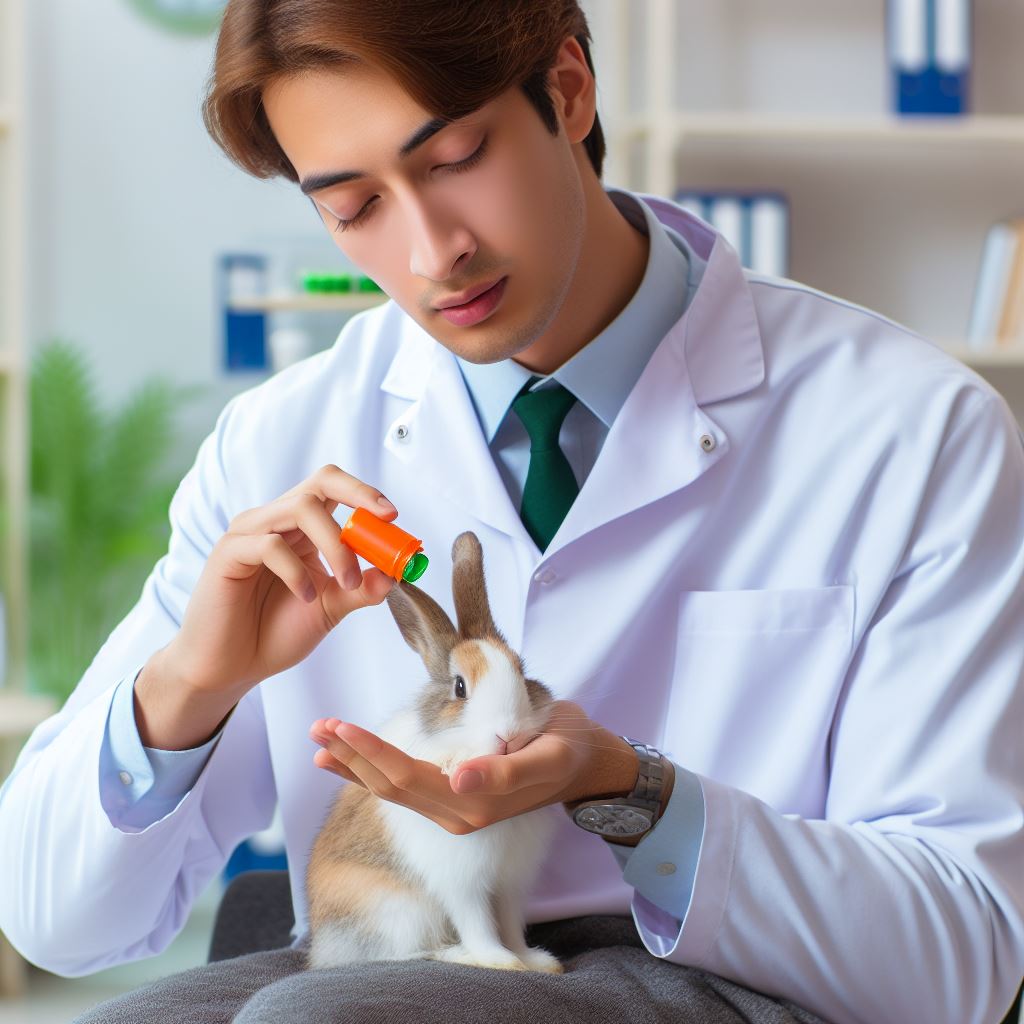Introduction
Importance of rabbit care
Rabbit care is crucial for ensuring the health and well-being of these adorable pets.
In this post, we will discuss the importance of rabbit care and provide an overview of common ailments that rabbits may experience.
Overview of common ailments in rabbits
Rabbits are vulnerable to several health issues, including dental problems, gastrointestinal stasis, and respiratory infections.
By understanding these common ailments, rabbit owners can take proactive measures to prevent them and ensure their pets live a happy and healthy life.
Dental problems are prevalent in rabbits due to their continuously growing teeth.
Regular check-ups and a proper diet consisting of hay and chew toys can help prevent tooth overgrowth.
Gastrointestinal stasis is a severe ailment where the movement of the digestive tract slows down or stops.
To prevent this, a high-fiber diet, exercise, and regular vet visits are essential.
Respiratory infections are common in rabbits and can be caused by bacteria or viruses.
Maintaining a clean and well-ventilated living environment is crucial to prevent these infections.
Additionally, rabbits are susceptible to parasitic infestations, skin conditions, and urinary tract issues.
Regular grooming, flea prevention, and providing a clean litter box can help prevent these problems.
Rabbit care involves providing a balanced diet, a safe and comfortable living environment, regular vet check-ups, and plenty of love and attention.
By following these guidelines, rabbit owners can reduce the risk of common ailments and ensure their furry friend’s well-being.
In the upcoming sections, we will delve deeper into each common ailment, discussing their causes, symptoms, prevention methods, and appropriate treatments.
Transform Your Agribusiness
Unlock your farm's potential with expert advice tailored to your needs. Get actionable steps that drive real results.
Get StartedStay tuned to learn how to effectively care for your beloved rabbits and prevent these health conditions.
Maintaining a Proper Diet
When it comes to rabbit care, ensuring they have a proper diet is crucial to preventing common ailments.
Here are some important points to consider:
Importance of a High-Fiber Diet
Rabbits have a unique digestive system that requires a high-fiber diet to stay healthy.
Fiber helps maintain good gut motility, preventing gastrointestinal issues such as gas and stasis.
Feeding your rabbit a diet rich in fiber can also help avoid obesity, dental problems, and overgrown teeth.
It’s essential to provide them with unlimited access to hay, which should make up the majority of their diet.
Types of Hay, Fresh Vegetables, and Pellets to Include in Their Diet
There are various types of hay available, but the best option for rabbits is Timothy hay.
It provides the necessary fiber, is low in calories, and helps wear down their teeth.
Other suitable types include oat hay, orchard grass hay, and meadow hay.
Aside from hay, fresh vegetables play a vital role in a rabbit’s diet.
Leafy greens like romaine lettuce, spinach, and kale are excellent choices.
Remember to introduce new vegetables slowly to prevent stomach upset.
Pellets are formulated specifically for rabbits and should be given sparingly.
They contain essential nutrients but can be high in calories.
It’s important to choose high-quality pellets and provide them in limited amounts, usually about 1/4 to 1/2 cup per day based on your rabbit’s size.
Avoidance of Harmful Foods
Not all foods are safe for rabbits. Certain items can be toxic or cause digestive problems.
Avoid feeding your rabbit any of the following:
- Chocolate
- Caffeine
- Dairy products
- Grains, seeds, and nuts
- Cabbage and cauliflower (in large quantities)
- Onions and garlic
- Processed foods and sugary snacks
Additionally, it’s important to keep household plants out of your rabbit’s reach, as many can be poisonous if ingested.
Providing Clean and Fresh Water
Water is essential for a rabbit’s overall wellbeing. Make sure your rabbit has access to clean, fresh water at all times.
A water bottle with a sipper tube is a convenient option, as it keeps the water clean and prevents it from being soiled.
Check the water bottle regularly to ensure it’s working properly.
It’s important to note that rabbits may not drink as much water if they’re obtaining enough moisture from their diet, especially if they’re eating plenty of fresh vegetables and a good variety of leafy greens.
Therefore, maintaining a proper diet for your rabbit is crucial to their overall health and the prevention of common ailments.
Showcase Your Farming Business
Publish your professional farming services profile on our blog for a one-time fee of $200 and reach a dedicated audience of farmers and agribusiness owners.
Publish Your ProfileRemember to provide a high-fiber diet with a variety of hay, fresh vegetables, and limited pellets. Avoid harmful foods and always ensure clean and fresh water is available.
Read: Breeding Tech: New Trends in Livestock Genetics
Maintaining a Clean Living Environment
Regular cleaning of the hutch or cage
- Clean the hutch or cage at least once a week to remove dirt and bacteria buildup.
- Use a mild detergent and warm water to clean the surfaces thoroughly.
- Rinse well to remove any soap residue that could be harmful to your rabbit.
- Allow the hutch or cage to dry completely before putting in fresh bedding and your rabbit.
Bedding options and proper bedding hygiene
- Choose the right bedding material for your rabbit, such as paper-based or straw-based bedding.
- Avoid cedar or pine shavings as they can be harmful to your rabbit’s respiratory system.
- Change the bedding at least once a week or more frequently if it becomes soiled or smelly.
- Remove any wet or moldy bedding immediately to prevent the growth of harmful bacteria.
Regular removal of waste to prevent bacterial growth
- Check and remove your rabbit’s waste daily to keep the hutch or cage clean and odor-free.
- Dispose of the waste in a sealed bag and throw it in an outdoor trash bin.
- Do not flush rabbit waste down the toilet as it can cause plumbing issues.
- Regular waste removal helps prevent the spread of bacteria that can make your rabbit sick.
Maintaining a clean living environment for your rabbit is crucial in preventing common ailments.
Regular cleaning of the hutch or cage, choosing suitable bedding options, and disposing of waste properly are essential steps in caring for your rabbit’s health.
By following these practices, you can create a safe and comfortable home for your beloved pet.
Read: Automated Watering Systems: A Game Changer
Regular Veterinary Check-ups
Regular veterinary check-ups are essential for ensuring the overall well-being and health of your rabbit.
These routine examinations play a significant role in preventing common ailments and maintaining a happy and active pet.
Importance of routine examinations
- Regular veterinary check-ups allow early detection of any potential health issues in your rabbit.
- These examinations help prevent the development of serious diseases by addressing minor concerns promptly.
- Veterinarians can thoroughly assess your rabbit’s condition, including weight, dental health, and overall body condition.
- Early detection and intervention of any health problems can greatly increase the chances of successful treatment.
- Regular check-ups enable veterinarians to establish a personalized preventive care plan for your rabbit.
- Veterinarians can provide guidance on proper nutrition, exercise, and other essential aspects of rabbit care.
Vaccinations and preventive medicines
- Vaccinations are an integral part of preventive care and help protect rabbits from various infectious diseases.
- Consult with your veterinarian to determine which vaccinations are necessary for your specific rabbit.
- Common vaccines include those for rabbit viral hemorrhagic disease (RVHD) and myxomatosis.
- Preventive medicines, such as flea and tick control, should be administered according to the veterinarian’s recommendation.
- These medicines help protect rabbits from external parasites and reduce the risk of transmitting diseases.
- Regular veterinary check-ups ensure that your rabbit is up to date on vaccinations and preventive treatments.
Finding a reliable rabbit veterinarian
- When looking for a rabbit veterinarian, seek recommendations from other rabbit owners or local rabbit rescues.
- Ensure that the veterinarian has experience and knowledge in treating rabbits specifically.
- Ask about the veterinarian’s approach to preventive care and how they handle emergency situations.
- Consider the location and availability of the veterinarian’s clinic, especially in case of urgent care needs.
- Take the time to visit the veterinarian’s clinic beforehand to assess its cleanliness and professionalism.
- A reliable rabbit veterinarian should have a good rapport with both you and your rabbit.
Most importantly, regular veterinary check-ups are vital for maintaining the health and well-being of your rabbit.
These examinations help prevent common ailments and ensure that your furry friend receives the necessary vaccinations and preventive medicines.
Finding a reliable rabbit veterinarian is crucial to providing your rabbit with the best possible care.
By prioritizing routine examinations, you can ensure a happy and healthy life for your beloved rabbit.
Read: Top 2024 Livestock Health Monitoring Gadgets

Regular Exercise and Mental Stimulation
In addition to providing proper nutrition and a comfortable living environment, regular exercise and mental stimulation are essential for the overall well-being of your rabbit.
These activities not only keep your pet physically healthy but also prevent common ailments and behavioral issues.
Creation of a Safe and Spacious Exercise Area
- Designate a specific area in your home where your rabbit can exercise freely.
- Ensure that the space is safe, free from any potential dangers such as electrical wires or toxic plants.
- Consider using a playpen or baby gates to create a secure and spacious exercise zone.
Engaging in Interactive Play with Toys
- Provide a variety of toys specifically designed for rabbits to keep them mentally and physically active.
- Choose toys that encourage your rabbit’s natural behaviors, such as chewing and digging.
- Rotate the toys regularly to maintain your rabbit’s interest and prevent boredom.
Ensuring Ample Mental Stimulation to Prevent Boredom and Behavioral Issues
- Interaction with your rabbit is crucial. Spend quality time with your pet every day.
- Engage in gentle petting and grooming sessions to strengthen the bond between you and your rabbit.
- Teach your rabbit simple tricks or provide treat-dispensing toys to challenge their problem-solving skills.
- Consider introducing a companion for your rabbit if they are social creatures. However, ensure proper introductions and compatibility before keeping them together.
Regular exercise not only helps maintain a healthy weight but also promotes cardiovascular health and proper digestion.
A sedentary lifestyle can lead to obesity, muscle atrophy, and even gastrointestinal stasis in rabbits. It is crucial to provide ample opportunities for physical activity.
Mental stimulation is equally important for rabbits as it prevents boredom, which can lead to destructive behaviors and even mental health issues.
Rabbits are intelligent animals that thrive on mental challenges and social interaction.
Neglecting their mental needs may result in behavioral problems.
By dedicating time each day to interact with your rabbit and providing an enriching environment, you can prevent common ailments and ensure their overall well-being.
Regular exercise and mental stimulation contribute to a happier and healthier life for your beloved bunny.
Remember, always consult with your veterinarian to ensure that the exercise routine and mental stimulation activities are suitable for your rabbit’s specific needs and medical condition.
Read: Innovative Manure Management Tools and Tips
Grooming and Hygiene Practices
Listed below are essential grooming and hygiene practices to ensure the well-being of your rabbit:
Brushing and combing the rabbit’s fur regularly
Gently brush and comb your rabbit’s fur at least once a week to remove loose hair, prevent matting, and promote a healthy coat.
Avoid using brushes with sharp bristles, and instead, opt for a soft brush or a comb specifically designed for rabbits.
Start from the head and work your way down towards the tail, following the direction of hair growth.
Pay particular attention to the areas behind the ears, under the chin, and around the anus, as these are prone to matting.
Trimming nails and checking teeth
Regularly trim your rabbit’s nails to prevent overgrowth, which can cause discomfort and difficulty in movement.
Use a pair of rabbit nail clippers and be careful not to cut into the quick, as it may lead to bleeding.
Inspect your rabbit’s teeth regularly for any signs of malocclusion or abnormal growth.
Malocclusion, misalignment of teeth, can result in pain, difficulty eating, and further dental problems.
Cleaning and checking the ears
Check your rabbit’s ears regularly for signs of dirt, wax, pests, or infections.
If there is excessive wax or dirt, use a damp cloth or a cotton ball moistened with veterinarian-approved ear cleaner to gently clean the external ear.
Avoid inserting anything into the ear canal, as it can cause damage or push debris further inside.
Should you notice any redness, swelling, discharge, or a strong odor, consult a veterinarian for further evaluation and treatment.
By incorporating these grooming and hygiene practices into your rabbit’s routine, you can help prevent common ailments and maintain their overall well-being.
Preventing Common Infections
Importance of Maintaining Good Hygiene Practices
Preventing common infections is essential for maintaining your rabbit’s overall health and well-being.
By practicing good hygiene, you can reduce the risk of your rabbit contracting various infections.
Showcase Your Farming Business
Publish your professional farming services profile on our blog for a one-time fee of $200 and reach a dedicated audience of farmers and agribusiness owners.
Publish Your ProfileRegularly wash your hands with soap and water, especially before and after handling your rabbit or cleaning its living area.
Additionally, keep the environment clean and disinfected to eliminate harmful bacteria and germs.
Identification and Prevention of Common Infections
Identifying and preventing common infections is crucial for providing proper care to your rabbit.
Regularly check your rabbit’s ears for signs of infection, such as redness, discharge, or foul odor.
If you notice any abnormalities, consult a veterinarian for appropriate treatment.
Keep an eye out for respiratory infections that can present symptoms like sneezing, coughing, wheezing, nasal discharge, or difficulty breathing.
Seek immediate veterinary care if your rabbit exhibits any of these signs.
Gastrointestinal infections can be prevented by offering a balanced diet, including fresh hay and water, and monitoring your rabbit’s bowel movements.
Provide clean litter boxes to prevent urinary tract infections and encourage regular hydration.
If you observe frequent urination or blood in the urine, consult your veterinarian for further evaluation.
Dental infections can be prevented by regularly checking your rabbit’s teeth for overgrowth, abscesses, or difficulty eating.
Signs and Symptoms to Watch Out For
Watch out for specific signs and symptoms that may indicate an infection in your rabbit.
Lethargy or reduced activity levels can be a cause for concern and should prompt a veterinary visit.
Loss of appetite or weight loss should not be ignored, as they can be indicative of various infections.
Changes in urination or fecal output, including excessive frequency or the presence of blood, may signify an underlying infection.
Pay attention to visible signs of discomfort, such as scratching, rubbing, or self-mutilation.
Any unusual discharge from the eyes, nose, ears, or genitals should also be taken seriously and evaluated by a veterinarian.
By following these preventative measures and staying vigilant for any signs of infection, you can help ensure the health and well-being of your beloved rabbit.
Remember to consult a veterinarian for proper diagnosis and treatment if you suspect your rabbit may have an infection.
Handling and Socializing with Rabbits
Handling and socializing with rabbits is essential for their well-being and overall happiness.
By using proper techniques, encouraging socialization, and recognizing signs of stress or discomfort, you can ensure a healthy and thriving relationship with your furry friends.
Proper Techniques for Handling Rabbits
- Approach rabbits calmly and gently, avoiding sudden movements that may startle them.
- Support their entire body, placing one hand under the chest and the other supporting the hindquarters.
- Avoid grabbing them by the ears or scruff as this can cause injury and distress.
- Never pick up a rabbit by their legs or tail, as these are delicate areas.
- Always keep a firm but gentle grip to prevent them from squirming or jumping out of your hands.
- Ensure a safe and secure environment during handling to prevent accidental falls or escapes.
- If your rabbit becomes anxious or scared, gently lower them back to the ground and try again later.
Encouraging Socialization with Humans and Other Rabbits
- Interact with your rabbits frequently, spending quality time petting, grooming, and playing with them.
- Offer treats as rewards to create positive associations with human interaction.
- Provide suitable toys and tunnels to encourage mental stimulation and physical exercise.
- Introduce your rabbit to new experiences gradually, allowing them to become comfortable at their own pace.
- Supervise socialization with other rabbits to prevent fights or injuries.
- Consider neutering or spaying your rabbits to reduce aggression and improve social compatibility.
- Consult a professional if introducing rabbits with different personalities or from separate households.
Recognizing Signs of Stress or Discomfort
- Observe your rabbit’s body language for signs of fear or anxiety, such as crouching or thumping their hind legs.
- Monitor eating and drinking habits, as a sudden decrease may indicate stress or illness.
- Notice changes in grooming behavior, such as excessive licking or fur pulling.
- Look for signs of aggression, including biting, scratching, or chasing.
- Listen for grinding teeth or loud vocalizations, as these may indicate pain or discomfort.
- Pay attention to changes in litter box habits, as rabbits may stop using it if they feel stressed.
- Immediately remove any stressors from their environment and seek veterinary advice if you suspect illness or severe distress.
Remember, rabbits thrive on human companionship and social interaction.
By handling them properly, providing opportunities for socialization, and being vigilant about their well-being, you can create a strong bond with your rabbits and ensure their happiness and health.
Identifying and Treating Common Ailments
In order to provide the best care for your rabbit, it is essential to be able to identify and treat common ailments.
By learning to recognize the symptoms and signs of illness, you can take prompt action and ensure your pet’s well-being.
Common Ailments in Rabbits
- Gastrointestinal Stasis: This condition occurs when the digestive system slows or stops completely, resulting in a lack of appetite, bloating, and reduced bowel movements.
- Respiratory Infections: Rabbits are prone to respiratory infections which can cause sneezing, nasal discharge, difficulty breathing, and lethargy.
- Dental Disease: Overgrown teeth, spurs, or abscesses can lead to oral pain, drooling, difficulty eating, weight loss, and in severe cases, infection.
- Mites and Fleas: Parasites like mites and fleas can cause intense itching, hair loss, redness, and skin irritation in rabbits.
- Urinary Tract Disorders: Bladder stones, sludge, or infections can result in frequent urination, blood in urine, discomfort, and reduced appetite.
Symptoms and Signs to Watch For
- Loss of appetite and reduced water intake
- Changes in litter box habits, such as reduced or absence of fecal pellets
- Lethargy and decreased activity levels
- Weight loss or sudden weight gain
- Unusual discharge from the eyes, nose, or ears
- Difficulty breathing or coughing
- Hair loss, bald patches, or red and inflamed skin
- Lameness or difficulty moving
- Bloated belly or abdominal pain
- Changes in behavior, such as aggression or depression
It is important to monitor your rabbit’s health closely and seek prompt veterinary care if any of these symptoms are observed.
Remember, rabbits are prey animals, and they may hide signs of illness until the condition becomes severe.
Knowing When to Seek Veterinary Care
- If your rabbit stops eating or has a significant decrease in appetite
- If your rabbit’s stools become smaller, softer, or cease altogether
- If your rabbit shows signs of pain or distress, such as teeth grinding
- If your rabbit has difficulty breathing or is coughing
- If you notice any abnormal changes in your rabbit’s behavior or appearance
Do not attempt to treat your rabbit at home without consulting a veterinarian, as some ailments require specific medications or procedures for effective treatment.
Delaying proper care can worsen the condition and endanger your pet’s health.
Regular veterinary check-ups are also crucial for maintaining your rabbit’s well-being, as many illnesses can be detected early through physical examinations and diagnostic tests.
In fact, by familiarizing yourself with common ailments, their symptoms, and knowing when to seek veterinary care, you can provide the best possible care for your rabbit.
Your attentive approach will ensure your furry friend’s health and happiness.
Discover More: Organic Poultry Farming: A Comprehensive Guide
Conclusion
It is vital to recap the key points discussed in this post.
We have learned about the common ailments that can affect rabbits and the importance of preventive care.
By taking the necessary steps to ensure the well-being of our furry friends, we can avoid unnecessary suffering and high veterinary costs.
It is essential to emphasize the significance of preventive care in maintaining the health of rabbits.
Regular check-ups, a balanced diet, and a clean living environment can significantly reduce the risk of illnesses.
Ultimately, responsible rabbit ownership plays a crucial role in the overall well-being of these adorable creatures.
By being responsible owners, we can provide our rabbits with the care and attention they deserve.
Showcase Your Farming Business
Publish your professional farming services profile on our blog for a one-time fee of $200 and reach a dedicated audience of farmers and agribusiness owners.
Publish Your ProfileThis includes meeting their physical and emotional needs, as well as seeking prompt veterinary care when necessary.
Let us all commit to being responsible rabbit owners and prioritize preventive care to ensure long and happy lives for our beloved pets.




